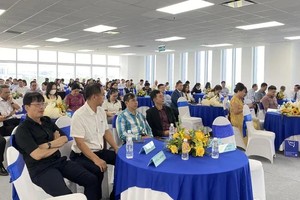
Statistics from the Telecommunications Authority of Vietnam (under the Ministry of Information and Communications) reveal that over 90 percent of the domestic telecommunications market belong to the three giants of Viettel, VinaPhone, and MobiFone.
However, Deputy Director General of VNPT Huynh Quang Liem commented that in 2019, traditional telecom services in the country witnessed unwanted recession. Particularly, voice services decreased by 18 percent. Although data services rose by 3 times, the revenues did not increase correspondingly.
Deputy Director General of Viettel Group Tao Duc Thang said that the growth in data services merely enough for his company to balance the loss from traditional services. Since telecommunications is still the main profit source but is experiencing a continuous fall, telecom enterprises need to become digital service and infrastructure provider to compensate for the loss. This is rather troublesome.
According to Head of the Vietnam Telecommunications Authority Hoang Minh Cuong, telecom companies can take advantage of the existing infrastructure nationwide to carry out digital and payment transformation processes in order to effectively cope with international competitions regarding data services. They can, for example, invest in cutting edge facilities and technologies like 5G, Internet of Things (IoT), Artificial Intelligence (AI); improve service quality; develop safe and self-adjustment methods; stimulate digital transformation in the company, the industry, and the nation scales.
Deputy Minister of Information and Communications Pham Hong Hai stated that his ministry is researching suitable management methods, especially the legal frames, to promote the sustainable growth of telecommunications and novel digital services such as no-cash payment in Vietnam.
Meanwhile, each telecom giant in the country has had its own development plan.
The year of 2019 marked the beginning of the digital transformation process in VNPT with the campaign ‘VNPT 4.0’. All digital-oriented services saw a significant rise. For instance, VNPTPay – a financial technology (fintech) service – had a 60-time increase in transaction cash flow. The Vietnam Data Exchange Platform (VDXP), the National Public Service Portal, and the e-government application run in 53 provinces demonstrate VNPT’s leading role in building an e-government.
MobiFone has finished digitalizing internal management tasks using E-office and Enterprise Resource Planning (ERP) as well as transaction activities at retail centers. It is going to apply IoT in automatically digitalizing its infrastructure and launch a specific platform to offer digital services to all clients, be they individuals or large businesses. As a result, its customers will be able to connect to several ecosystems like e-government, public security services, home health care.
Viettel Group has already launched various major projects regarding e-government, smart city, education – healthcare – traffic modernization. Particularly, its ViettelPay ecosystem – a digital payment platform – has a cash flow of VND50,000 billion (approx. US$2.15 billion) per month.
President cum Director General of Viettel Group Le Dang Dung stated that his company is going to introduce self-research 5G equipment into the national network in order to reduce investment cost while ensuring cyber security.
In addition, Viettel is preparing proper infrastructure for the launch of Mobile Money (a service about electronic money on mobile devices) to serve millions of subscribers living in the countryside, especially in remote areas out of reach of banks.
It seems that 5G-based services as well as digital platforms and services will become a fierce competition of these domestic telecom giants in the upcoming time, bringing along several benefits for consumers.
























